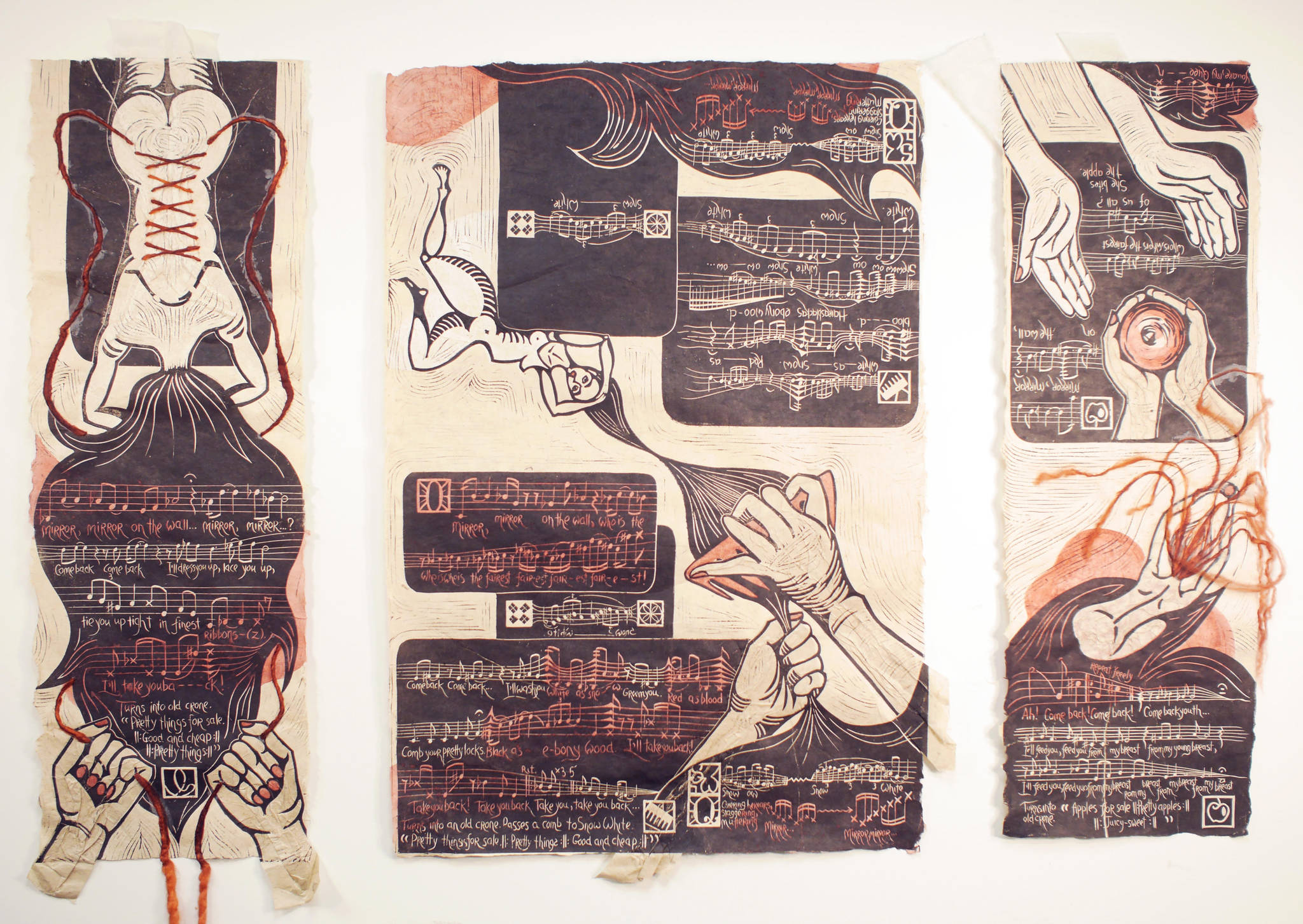Bunnell Street Art Center’s latest Artist in Residence, Anna Pidgorna, presents a diverse array of interests and accomplishments as a composer, a musician, vocalist, and a visual artist. She also brings elements of creative writing and carpentry into contemporary practice.
Pidgorna visits for a two-part residency with Bunnell Street Arts Center through a newly commissioned work.
During her initial two-week residency this month, Pidgorna began innovations to a Wild Shore/Bunnell commissioned work.
In the fall of 2019, Pidgorna will return to Alaska combining the Wild Shore Trio (Katie Cox, flute; Andie Springer, violin and Mary Kouyoumdjian, piano and co-artistic director) and violin-voice duo CIPHER (soprano Justine Aronson and violinist Sarah Goldfeather) to provide a world premiere of her work.
On Thursday, March 7, Bunnell hosted a composer’s talk and potluck reception to introduce Pidgorna to the community and provide a venue for her to share some of her past experience through an extensive presentation on past projects and a general overview of some of her diverse interests and inspirations. The setting was intimate, with a small group of local artists and musicians eager to hear about her practice and experiences.
In addition to a brief introductory residency that brought her to Homer, Pidgorna is completing a doctorate degree in music composition at Princeton University.
The dimensions that inspired her into that field and what she is pursuing there have many features. To start with, Pidgorna is Ukrainian born, and folklore from that culture is an earnest point of inspiration for her compositions.
At the Bunnell reception, she displayed an array of acoustic pieces starting with an example of Ukrainian women that Pidgorna recorded in a casual kitchen space in the northern part of the country in 2012.
Pidgorna had the opportunity to travel there when she received a Canada Council Grant to research Ukrainian folk vocal performance.
Later, she talked about the absence of men and some of the ways gender influences repertoire: sometimes separated and sometimes mutual. Dimensions vary.
Born in the Ukraine, Pidgorna grew up in Canada. She completed undergraduate studies at Mount Allison University in Sackville, New Brunswick, in the field of music and followed with a master’s degree, also in music, at the University of Calgary.
In a second presentation example, she explained her contribution to an opera entitled “Wild Dogs,” based on a novel of the same name by Canadian author Helen Humphreys.
Pidgorna described a bit of the story behind the project that involves a young girl, Lily, suffering from brain damage from a burning home.
Lily traveled into the woods in search of her lost dog, lost herself and received nourishment from a feral dog pack who adopted and sheltered her.
When composing the score for this piece, Pidgorna explored vocal and instrumental sounds she could use to imitate a natural soundscape of the forest.
In her presentation, she included videos of herself imitating howls, barks and whines of a canine pack, and a communal chorus of frogs. Her explanation suggests how words can be inherently elusive or difficult to find an accurate recreation of natural sound.
Interpretation and expression sometimes need elements beyond the boundaries of human language.
Another project shared was a piece called “Through Closed Doors.” Working with family on the renovation of a heritage home and restoring wood work, Anna found inspiration in a violently damaged door.
Her composition was fully instrumental and its eventual established intention was structured to capture the storyline of passionate communication between two individuals through the door.
Arrangement of music on the door is designed so that musicians performing the piece must physically move around the door to act out dramatic dimensions of the piece.
Though this large and heavy musical score of the door is difficult to coordinate shipping, it will make its way to Homer to be featured at the Wild Shore Festival in September 2019.
Another piece shared was a re-creation of the original Grimm fairytale of “Snow White.” For this piece, Pidgorna worked carefully with linoleum cuts and hand-made elements of yarn, watercolor and crafted paper.
“I was very particular about the texture, feel and color of the visual elements for this in order to capture the violence and gore of this dark fairy tale,” she said.
The visual pieces explore the mother and daughter relationship of the story features: a poisoned comb, a lace corset and an apple.
In a later interview, Pidgorna explained how this field of work provides her the opportunity to observe places she would not otherwise attend and or focus on directly.
She explained a visit she made to the community of Russell, Kansas, to participate in the Ad Astra Festival.
“It is always very fulfilling to meet locals, visit homes, share their generosity in creating and supporting festivals,” Pidgorna said. “Kansas provided an opportunity to visit a place I probably would never go, otherwise. It was very beautiful in its own way with the rolling hills and grasslands.”.
Another example was a recent visit to Rockport, Massachusetts, “a small fishing town,” she explained.
“It was an adorable community with a beautiful concert hall facing the Atlantic Ocean,” she said.
Next, she is waiting to hear about a work opportunity that would include a visit to Ireland.
On a walk through the crusty snow around Homer’s Hornaday Park Campground, she said, “Doing things like this, being outside, is one of the things I love about my job. I’m really just looking to absorb the elements of being here and investigating Alaska interpretations of landscape experience, through poetry, legends or other formats.”
For an audible example of her work, Pidgorna has many compositions that can be found via her on-line website: http://www.annapidgorna.com/.
Emilie Springer is a freelance writer living in Homer.

